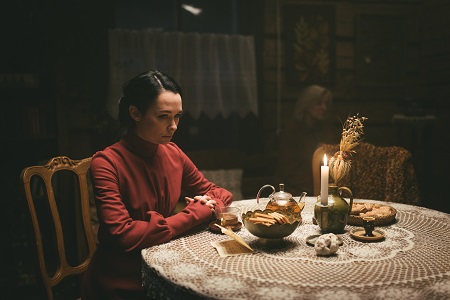
Imaginative Possession Drama Mercy a Welcome Surprise
After returning home to a remote corner of Latvia when her father (Andrey Yahimovich) falls deathly ill, single mother Madaline (Kristen Ruhlin) suddenly begins to showcase violent signs of the stigmata. Urged by her childhood priest Father Joseph (Juris Strenga) to get help before she inadvertently hurts someone, likely either her estranged mother Alyona (Ieva Seglina) or her beloved daughter Willow (Sophia Massa), the young woman agrees to be taken to the secluded island convent Mercy to be treated by their Mother Superior (Eileen Davies). She is familiar with the family’s complex theological history and as such she’s certain she can be of service to Madaline.
But where showcasing elements of the stigmata is oftentimes more of a blessing than it is a curse, this is unfortunately not one of those instances. Madaline, an atheist who gave up on her religious beliefs as a child when her parents sent her away to be raised abroad, isn’t happy about being separated from her daughter and forced to live in an isolated convent. Additionally, her bouts of bloody supernatural behavior appear to be born from demonic possession and deep-rooted familial trauma more than they do anything godly or virtuous, and as such overcoming this affliction will prove to be difficult. Only Mercy novitiate August (Lily Newmark) seems willing to listen to the young mother’s pleas for help with anything approaching genuine concern, the two women quickly forming a close, almost unbreakable bond that might be doing Madaline more harm than good.
I give Welcome to Mercy all kinds of credit for attempting to put its own uniquely imaginative spin on the demonic possession story. Director Tommy Bertelsen (Feed) and writer/star Ruhlin go out of their way to ground events in a heartfelt, complex emotionalism that is born from unimaginable tragedy, allowing Madaline’s story to be more about concepts of forgiveness, sacrifice and regret more than it has to do with anything purely supernatural. It’s an interesting take on this horror subgenre, giving things a little more character-driven gravitas than they otherwise might have had.
Is it enough? That’s hard to say. I never felt as deeply as connected to what Madaline was going through as I kept wanting to be, and committed as Ruhlin is to giving a frazzled, psychologically discombobulated performance, I still had trouble caring about was happening to her. The script the actress has composed is almost too indistinct and ephemeral, and while I appreciate that she and Bertelsen trust their audience to assemble this puzzle for themselves, they’ve made it so difficult to do so putting forth the effort to put the pieces together isn’t always worthwhile.
But the ambiance that the director manages to concoct is sensational. Bertelsen creates an air of uncertainty that fits Madaline’s wavering mental state perfectly. This might be the first time I can recall a film dealing with possession where the primary point-of-view is of the person who is currently under demonic assault. For the majority of the story the audience must see things through Madaline’s eyes, joining her as she attempts to figure out what is going on with her as she tries to determine who she can trust and whether or not she’s as much of a threat to her daughter as those at the Mercy convent keep trying to make her believe she is.
The effect of tackling this story in this a fashion is that it allows the twists and turns of the final act to not feel cheap or inauthentic. It also ratchets up the emotional content to a level that I did not anticipate. This movie becomes more about the lengths that parents will go to in order to keep their children safe from harm more than it does anything else. It is also a tale about the search for forgiveness, Alyona ultimately far from the uncaring, self-centered mother she purposefully allowed Madaline to believe she was for most of her daughter’s life. The final 15 minutes are explosive, not so much for their scares (there really aren’t any) but because of the way Bertelsen and Ruhlin so deftly pull at the viewer’s heartstrings. It’s pretty stunning, asking questions regarding faith, religion, parenthood and self-sacrifice I found moving.
I could have done without the film’s final scene, a standard fade to black that’s only there to be something of a final stinger designed to send the audience out of the theatre reeling from one last little scare. It’s a dumb add-on that also has the unintended side effect of diluting the emotive power of the events of the climax, this little coda playing to the sort of stale genre tropes the filmmakers had managed for the most part to avoid up until this point. Still, I really liked all of the risks the movie takes as it presents its tale of family tragedy and demonic possession. Bertelsen and Ruhlin should be commended for their ingenuity and imagination, and even if Welcome to Mercy doesn’t get everything right, this still manages to be an effective, character-driven shocker I feel is worthy of a look.
Film Rating: 2½ (out of 4)








